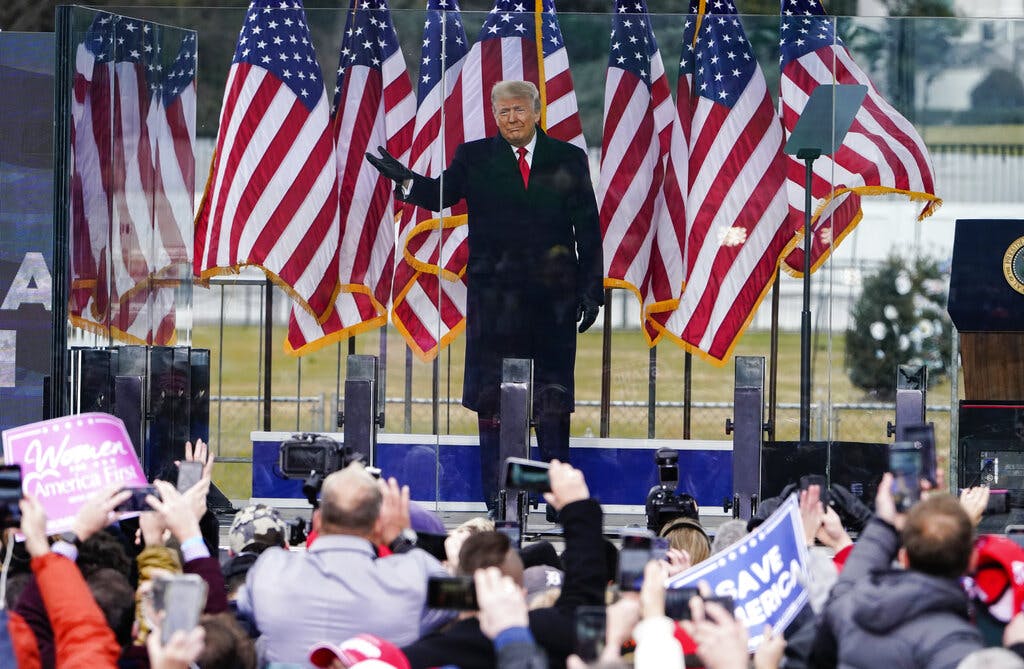Trump’s Most Loyal Supporters Look To Hale Him Into Court
Leader of Oath Keepers militia and a group of his confederates preview a legal defense to the charge of seditious conspiracy that implicates the former president.

The highest-profile trial to stem from the events of January 6 — that of Elmer Stewart Rhodes III and other Oath Keepers — could bring to the stand the highest-profile witness of them all: President Trump.
That possibility has come into focus as Mr. Rhodes — the leader of the Oath Keepers militia — and a group of his confederates have previewed a legal defense to the charge of seditious conspiracy that squarely implicates Mr. Trump. In a December 2020 letter, Mr. Rhodes urged Mr. Trump, “You must call us up and command us.”
In a trial that began on Monday, Mr. Rhodes and four associates stand accused of plotting to stop the transfer of power to President Biden. Oath Keepers, although not Mr. Rhodes himself, stormed the Capitol that day, in a range of tactical and battle gear. While he hung back, prosecutors allege, he was the coordinating ringleader for the enterprise.
While the fate of the Oath Keepers will likely hinge on whether they can convince the jury that they were in fact preparing to fulfill the law rather than break it, the suggestion that Mr. Trump’s intentions at the time are relevant to January 6 defendants is not an entirely novel one.
One such defendant, Dustin Thompson, sought to subpoena Mr. Trump to show that the president “engaged in a concerted effort to deceive the public, including the defendant, into believing that American democracy was at stake if Congress was permitted to certify the election results.”
Such a tactic would support an argument that those who stormed the Capitol were themselves victims of Mr. Trump’s orchestrated plan. Unearthing such intent has been a primary focus of the January 6 committee.
Mr. Thompson’s lawyer, Samuel Shamansky, told the New York Times that the “Constitution guarantees and demands Trump’s appearance at trial” given that his client felt he received “presidential orders” to attack the Capitol. Once inside, he stole a coat rack and bottle of bourbon from the Senate parliamentarian.
The judge hearing Mr. Thompson’s case, Reginald “Reggie” Walton, has thus far evinced skepticism that such a step would be necessary, given the copious quantity of audio and visual material available. In 1990, President Reagan delivered videotaped testimony at the Iran-Contra-related trial of a former national security adviser, John Poindexter.
Mr. Rhodes and company aim to pursue a related defense to the one proffered by Mr. Thompson. Against prosecutors’ accusations that they aimed at “armed rebellion,” the Oath Keepers maintain that they stood ready to obey the summons of the Commander in Chief.
This readiness, Mr. Rhodes’s attorneys have begun to argue, was in anticipation of Mr. Trump invoking the Insurrection Act. That 1807 law empowers the president to use the military in response to domestic crises following a proclamation as to the necessity of such a call up.
Mr. Rhodes is expected to take the stand to elaborate on his expectation that the Insurrection Act would be invoked and that his activities in the days leading up to January 6 were what his lawyers call “actually lobbying and preparation for the President to utilize” the law.
Mr. Trump has floated such a decision in the past, most notably to quell the rioting that ensued in the summer of 2020 after the killing of George Floyd. One of his top aides, Stephen Miller, entertained the move in response to the immigration crisis at the southern border. The New York Times reported that the secretary of defense, Mark Esper, quashed that notion.
That might not be the easiest case to make. One of Mr. Rhodes’s own lawyers, James Lee Bright, told the Associated Press that this is “an incredibly complicated defense of theory and I don’t think that it’s ever played out in this fashion in American jurisprudence.”
For Mr. Rhodes and his lawyers to pull it off, they would have to convince a jury that they intended not to topple the American government, but to defend it. In a court filing, his lawyers wrote that rather than continue the assault, “Rhodes and the others left the Capitol grounds and went to Olive Garden for dinner.”
On the first day of trial, the government countered that defense by disclosing a January 10 recording in which Mr. Rhodes confessed that his “only regret is that they should have brought rifles.” The general counsel for the Oath Keepers, Kellye SoRelle, faces multiple charges in connection with January 6.
In their opening statements, prosecutors shared an encrypted message sent by Mr. Rhodes to some of his top lieutenants: “We aren’t getting through this without a civil war.” In the words of the Department of Justice, that rhetoric indicates that Mr. Rhodes “concocted a plan for an armed rebellion to shatter a bedrock of democracy.”

